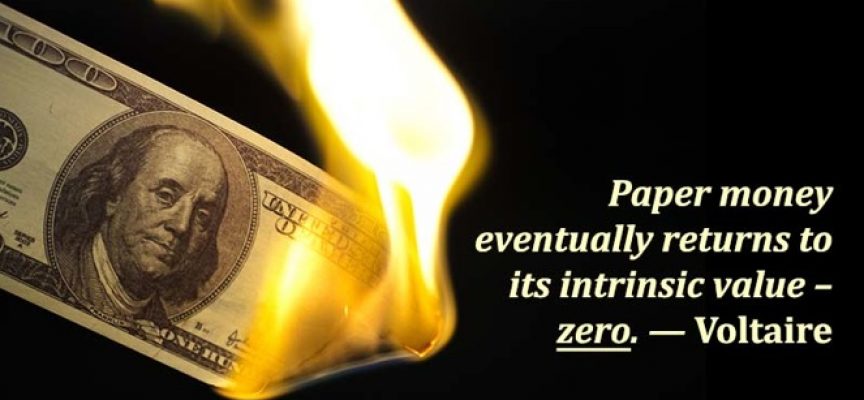I became your enemy because I tell you the truth
“You can fool some of the people all the time and all the people some of the time,
but you can’t fool all the people all the time.” A. Lincoln
Understanding dollarization and how it affects both the United States and other countries is prudent. And it’s important to know why more countries are calling for de-dollarization and how that affects the U.S. economy.
Worldwide Dollarization and How It Works
The U.S. dollar is part of 88 percent of all international transitions. It is the dominant international reserve currency. The result is that every central bank and major firm worldwide keeps U.S. dollars among their foreign exchange holdings.
Because of these holdings, the abundance of these dollars drives a portion of the demand for U.S. government bonds in the financial markets.
Third-World Countries and Dollarization
When a foreign country recognizes the U.S. dollar as legal tender or a medium of exchange in place of or alongside its domestic currency, it uses dollarization.
Dollarization often occurs in developing countries. That’s because many have a weak central monetary authority or a volatile economy.
It usually happens when a local currency has become unstable. At this point, the local government’s currency begins to lose its usefulness as a medium for exchange in market transactions.
For example, if the citizens of a foreign country are experiencing rampant inflation, they may choose the dollar to conduct day-to-day transactions. This is because their currency has less buying power.
The local government is also outsourcing its monetary policy to the United States.
The local government is tied to the U.S. economy’s interest, not their interests. But it allows the country to economize on resources needed to manage its currency supply.
Dollarization mainly benefits small countries with strong economic ties to the United States. Dollarization also makes economic integration easier worldwide. It establishes a sound financial sector and promotes strong financial growth.
Process of De-Dollarization
The U.S. dollar is the default currency in international trade. But the process of de-dollarization has begun.
Russia and China are working together to reduce reliance on the dollar. Ruble–yuan trade has increased eighty-fold since the Russia’s war on Ukraine. And according to the Russian news agency Vedmosti, Russia and Iran are working on launching a gold-backed cryptocurrency.
The size and strength of the U.S. economy have backed the dollar’s prominence. But some countries like Russia and China claim gold should back currency. Others, like some African nations, want to trade in currencies backed by valuable earth metals, while South American countries want currency backed by copper deposits.
Other nations have different scenarios. The United Arab Emirates and India, for example, are discussing using rupees to trade non-oil commodities.
Why Is De-Dollarization Growing?
One motivation behind de-dollarization is mitigating the impact of U.S. sanctions. Russia, in particular, has been motivated to de-dollarization due to sanctions.
To curb inflation, the U.S. Federal Reserve raised interest rates. This had a ripple effect on central banks and, consequently, leading developed countries.
Besides inflation, post-COVID-19 imbalances, the Ukrainian war and energy imbalances strengthened the call to de-dollarization.
What Does De-Dollarization Mean to the US?
With dollarization, there is an international demand for U.S. Treasurys. But alternative currencies may result in diminished interest in tradable U.S. debt.
In the short term, that would lead to higher yields and higher debt-service levels on U.S. Treasury securities.
But in the long run, it could force a reduction in U.S. spending, which in turn could result in higher inflation and higher taxes for American citizens.
De-dollarization also diminishes the effectiveness of U.S. sanctions if there is a world crisis.
Will Dollarization Succeed?
The U.S. dollar is still dominant among global foreign exchange reserves. But its share in central banks has dropped from 1999’s 70 percent. By the fourth quarter of 2022, the U.S. dollar accounted for 58.36 percent of foreign exchange reserves. The euro is second with 20.5 percent, while the Chinese yuan is 2.7 percent.
With China globally dominating trade, it is making the biggest push toward de-dollarization. China currently has the world’s second-largest economy, and it is also the biggest importer and exporter.
China was the largest trading partner for 61 countries. In comparison, the United States was the largest trading partner to 30 countries.
How Far Away Is De-Dollarization?
Despite the brewing Wild West of currency trades, the international reserve system is still a U.S. reserve-dominated system. In other words, the dollar is still king.
With only 2.7 percent in total reserves, China’s yuan has a long way to go before it can rival the dollar. And China is operating under current account restrictions, such as its limitations on capital flow.
But de-dollarization is now part of the international landscape and should be watched. There may not be a total break from the dollar, but another player may step up.
The Epoch Times Copyright © 2022 The views and opinions expressed are those of the authors. They are meant for general informational purposes only and should not be construed or interpreted as a recommendation or solicitation. The Epoch Times does not provide investment, tax, legal, financial planning, estate planning, or any other personal finance advice. The Epoch Times holds no liability for the accuracy or timeliness of the information provided.
All it takes for Evil to triumph is for good people to do nothing
https://www.theepochtimes.com/is-de-dollarization-a-real-possibility_5224441.html?utm_source=goodeveningnoe&src_src=goodeveningnoe&utm_campaign=gv-2023-04-27&src_cmp=gv-2023-04-27&utm_medium=email&est=bhgZSgSZAtQRYIbafqAFvvfPLr%2B9OeUXWJ4zP547iiDWq8C85kq90DGht3sNWQYtNCud
Michael Loyman
